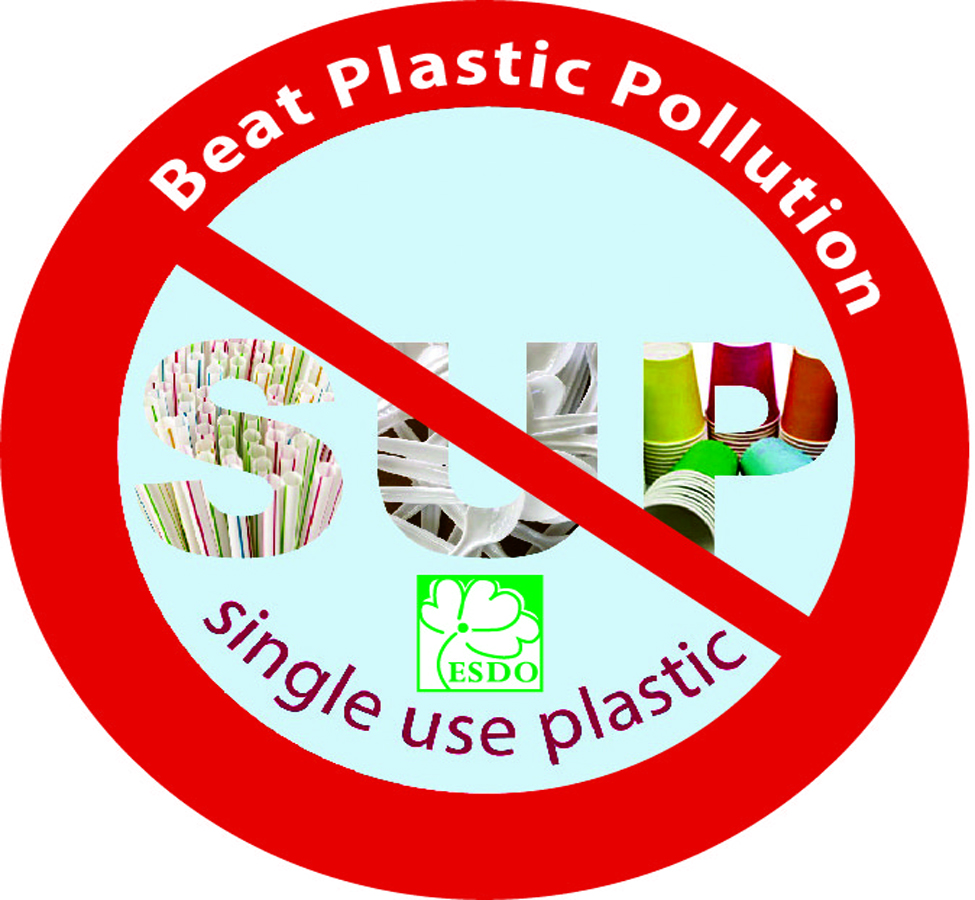About Us
Environment and Social Development Organization- ESDO is a Bangladeshi organization working to spread the message about the need for environmental conservation – to ensure the protection of biological diversity and ecological balance. Since the official formation of ESDO in 1990, ESDO focused on generating knowledge amongst the wider community about how human activity can negatively impact the environment of Bangladesh. As a service oriented non-profit, non-government organization, ESDO strives to improve the livelihoods, socio-economic status and simultaneously the environmental education of communities in Bangladesh. ESDO invests in the people to care for the environment through providing essential inputs and capacity building. Environmental and Social Development Organization- ESDO wants to ensure self-reliant communities who live in harmony with their environment.
Mission & Vision
The mission of ESDO is to promote and encourage an environmental movement through a participatory democratic framework involving diverse social groups, and to assist them with ideas, information, and leadership for promoting a safe and sustainable environment.
The vision of ESDO is to see Bangladesh achieve the Sustainable Development Goals, and put forth efforts to protect the environment through environmental education; reduce poverty; increase literacy rate and education; empower women in rural communities and improve sanitation and health services.
Activities
Environment and Social Development Organization- ESDO conducts consultations, workshops and meetings with government agencies, relevant stakeholders, project partners, industrial associations, health professionals, multi sector group of people about the adverse effects of single use plastic and other significant environmental pollutants including lead and mercury. Dialogue with policy makers, press briefing, policy lobbing with governmental body are regular activities of ESDO. Awareness raising and educational campaign are conducted among students, volunteers, researchers, practitioners and all other groups of stakeholders .Base line study, field survey, direct interview, documentary, case study are conducted to estimate the level of awareness of general people about environmental pollution. Besides, IEC materials are developed and distributed both in print and electronic way as a part of most of the educational programs.
ESDO also operates social media campaigns through multiple platforms including Facebook, Instagram, YouTube, Twitter etc. ESDO successfully grabbed attention of the national and international media on its awareness campaigns and study programs. ESDO’s activities have been featured in many of the national and international media platforms.
ESDO Initiatives to Ban Single Use Plastic
Anti Polythene & No Plastic Campaign, 1990
ESDO is the pioneer organization to ban the use of polythene/ plastic shopping bags in Bangladesh. In 1989, under the leadership of Dr. Shahriar Hossain, Secretary General of ESDO, a few enthusiastic people initiated nationwide anti polythene campaign in Bangladesh.
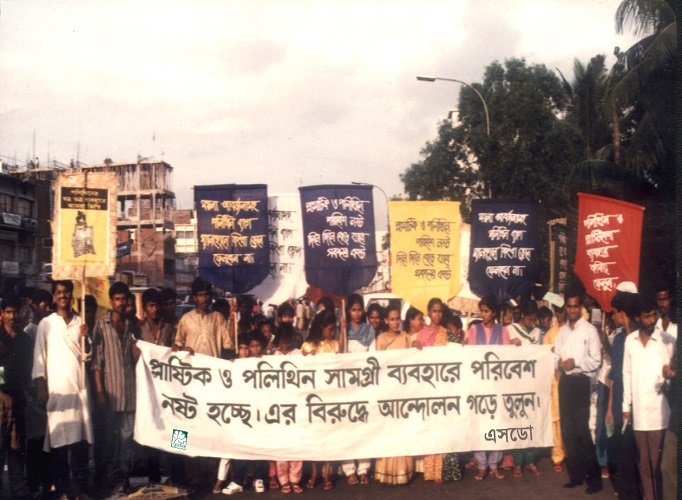
Polythene Shopping Bag Ban, 2002
In May, 1993, approximately 500 people took part in a protest supporting the ban of polythene bag production and use. After long efforts, ESDO succeeded to push the government in banning the production and use of polythene shopping bags in Bangladesh in 2002.
Microbeads Pollution Study, 2015-16
Environmental and Social Developmental Organization (ESDO) carried out an extensive study on microbeads prevalence, usage in Bangladesh from January, 2015 to October, 2016. Combining primary survey findings, information and secondary information from literature review a national report entitled “Microbeads: Unfold Health Risk and Environmental Pollutant’’ was published in October, 2016.
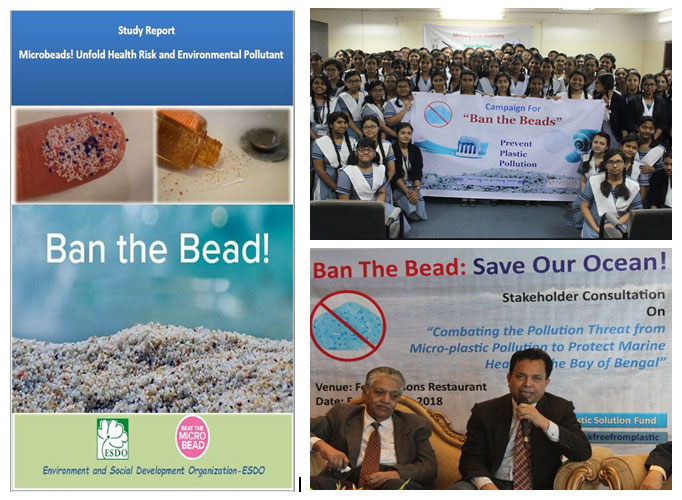
Ban Single Use Plastic Campaign, 2017- Continued
From 2017, ESDO focused on single use plastic pollution in Bangladesh and introduced “Ban Single Use Plastic” Campaign. ESDO organized awareness campaigns, rallies, mobile campaigns, workshops, seminars, press briefing, human chain across the country to create mass awareness and raise public voice in support of banning single use plastic. The organization conducted a nationwide survey on single use plastic in 2018 and 2019 and revealed the study report entitled as “Single Use plastic: Hidden Costs of Health and Environment in Bangladesh” in October, 2019.
“Ban SUP” campaign is being operated under the provision of ESDO’s project entitled as “Combating the pollution threat from micro plastic litter to save marine health in the Bay of Bengal”.
On 6th January 2020, ESDO along with 11 other organisations filed a writ petition to the High Court Division for banning single-use plastic products in coastal areas, hotels, motels and restaurants across the country in one year as they are health and environmental hazards. This case is under trial and meanwhile, High Court Division ordered to phase out single-use plastic by 2022.
About the project: The project aims to educate consumers, retailers, wholesalers, producers and other stakeholders about the nature of the single use plastic pollution problem, including the health and environmental impact. ESDO has a great deal of experience in working with disposable plastic bags, and we will continue to influence this experience to draw the attention of policy or decision makers in order to formulate appropriate regulation to ban SUP. Our communication with the general public are intended to mobilize informed public to act as a ‘pressure group’ to demand the cessation of SUP, as well as safe options in personal or home care products. The project will also refer to the example of first world countries which have already begun to ban microbeads and single use plastic products. Our main tasks will be to raise public voice to stop production and usage of microbeads and single use plastic in every sectors, dialogues and consultation with policy makers and member of parliaments and create public pressure to multinational companies and SMEs to redesign their single use plastic products with alternatives. In addition, we have been coordinating with organizations in other countries (e.g. India, Myanmar, Sri Lanka) bordering the Bay of Bengal, since interventions in Bangladesh alone cannot stop the degradation of the Bay of Bengal considering the trans boundary movement of plastic wastes.
Project Goals:
1. Build awareness among the public, policymakers, and producers on the plastic pollution in the Bay of Bengal caused by microbeads, sachets, plastic tubes, and other single use plastics / packaging in personal and home-care products.
2. Encourage people about reduction in the volume of use of Single-Use Plastic items to decrease accumulation of plastic litter in marine environment.
3. Initiate dialogues with several global and local consumer products companies for altering their business in line with reducing or eliminating SUP plastic products in Bangladesh market.
4. Secure governmental regulation to ban manufacture and use of SUP in Bangladesh to reduce its adverse impacts.
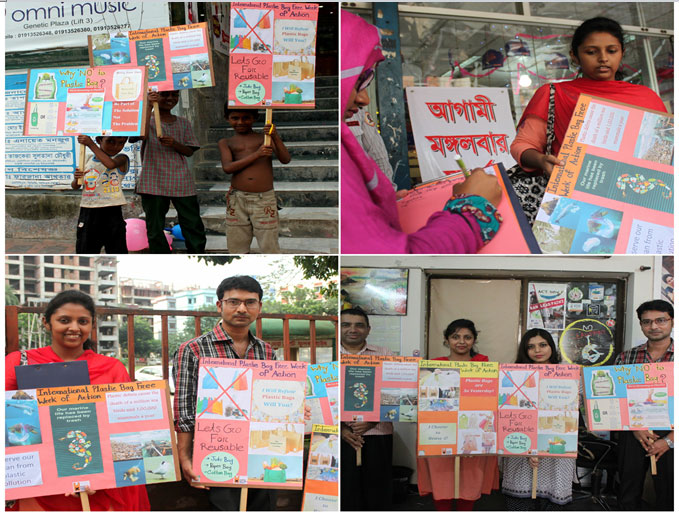
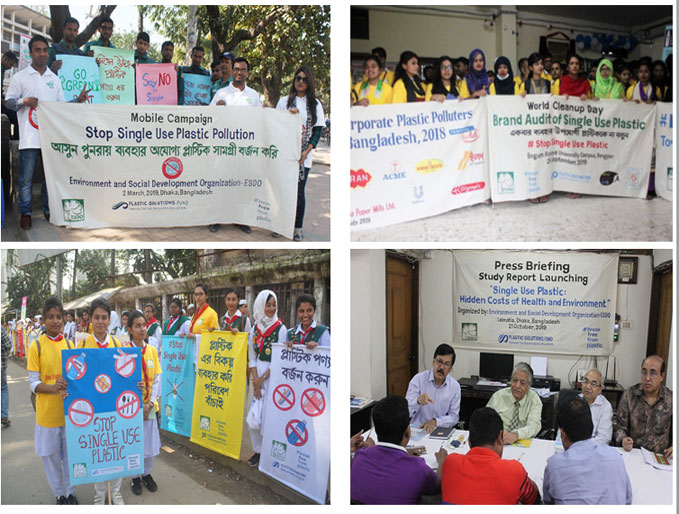
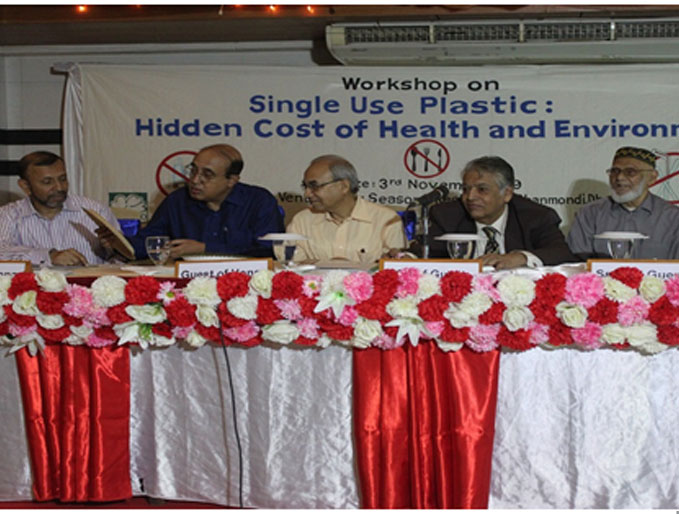
Bangladesh Government Initiatives to Ban Single Use Plastic
Due to continuous advocacy the Government of Bangladesh along with the Ministry of Environment, Forest, and Climate Change has taken the following initiatives :
- Ministry of Environment has given a directive to the Chairman of the Trading Corporation of Bangladesh (TCB) to stop using plastic bags in open markets made of polythene, polyethene, polypropylene and to use biodegradable bags instead. TCB has instructed all its dealers to stop using plastic bags in response to the letter.
- 25 meetings with hotel, motel, and restaurant authorities were conducted and around 7000 leaflets were distributed by the Department of Environment to discourage the use of single-use plastic items.
- 638 hotels, motels, and restaurants have been notified to stop using single-use plastic items. It was also stated in the condition that plastic cups, cutleries, plates, glass, would have to be stopped completely.
- A national committee has been formed under the leadership of the Director-General of the Department of Environment to improve solid waste management including plastic waste.
- A new wing is being constructed in the Department of Environment to give proper emphasis on plastic and chemical waste. They have already submitted a draft of an action plan to stop single-use plastic items.
- An official directive has given to Bangladesh Inland Water Transport Authorities to dispose safely of the used polythene bags and multilayer packaging items in ships, launches, steamers, ferry.
- Several decisions were made to stop single-use plastic items in the internal meeting of the Ministry of Environment, Forest & Climate Change held in December 2020 and a technical committee was formed consisting of 22 members.
- The Ministry of Environment, Forest & Climate Change has also sent a request letter to the cabinet to stop using lamination films used for enhancing Government leaflets, posters, invitation letters as those are not completely recyclable.
- A mass notification was sent to the manufacturers of multilayer packaging items that are not recyclable or reusable to dispose of these items under the Polluter Pay Principle to discourage the use of this type of items.
- Ministry of Civil Aviation and Tourism has sent a letter was sent to the beach committee for ensuring the proper disposal of the used single-use plastic items by tourists and in the hotels, motels, and restaurants.
- The Ministry of Environment, Forest & Climate Change has already taken initiatives on updating the rules regarding medical plastic waste management.
- Circular Economy and Extended Producer Responsibility for Non-Biodegradable and Disposable Plastic has already been asked to be included in the planning by the Ministry of Environment, Forest & Climate Change.
Gazette to Ban Single-Use Plastic in 12 Coastal Areas of Bangladesh
ESDO has been advocating continuously for the complete ban of Single-use Plastic. As a result, the High Court of Bangladesh based on a writ petition filed by BELA on behalf of ESDO has ordered the authorities concerned to prepare the ground for banning single-use plastics in coastal areas, hotels, motels, and restaurants across the country in the 2021 year. Later in a hearing on 10th February 2021, the High Court of Bangladesh ordered the concerned authorities to phase out Single-use plastic products within 31 December 2023 from the coastal area. Following the High Court’s order, the Ministry of Environment, Forests and Climate Change has issued a gazette instructing all concerned to completely stop the use of single-use plastic from 12 coastal districts of Bangladesh by 2023.
ESDO' Initiative on Plastic-Free Campus
ESDO initiates “Plastic Free Campus (PFC)” project to help school children to combat single-use plastic pollution in Bangladesh. Through this project, ESDO & partners are planning to include ten schools in five divisions in Bangladesh; namely Dhaka, Rajshahi, Khulna, Sylhet, and Rangpur. This project’s goals are to develop a second generation of environmental leaders, inform the younger generation about plastic pollution, and train them to reject single-use plastics. Additionally, start living a waste-free lifestyle from home to school and create a plastic-free campus.
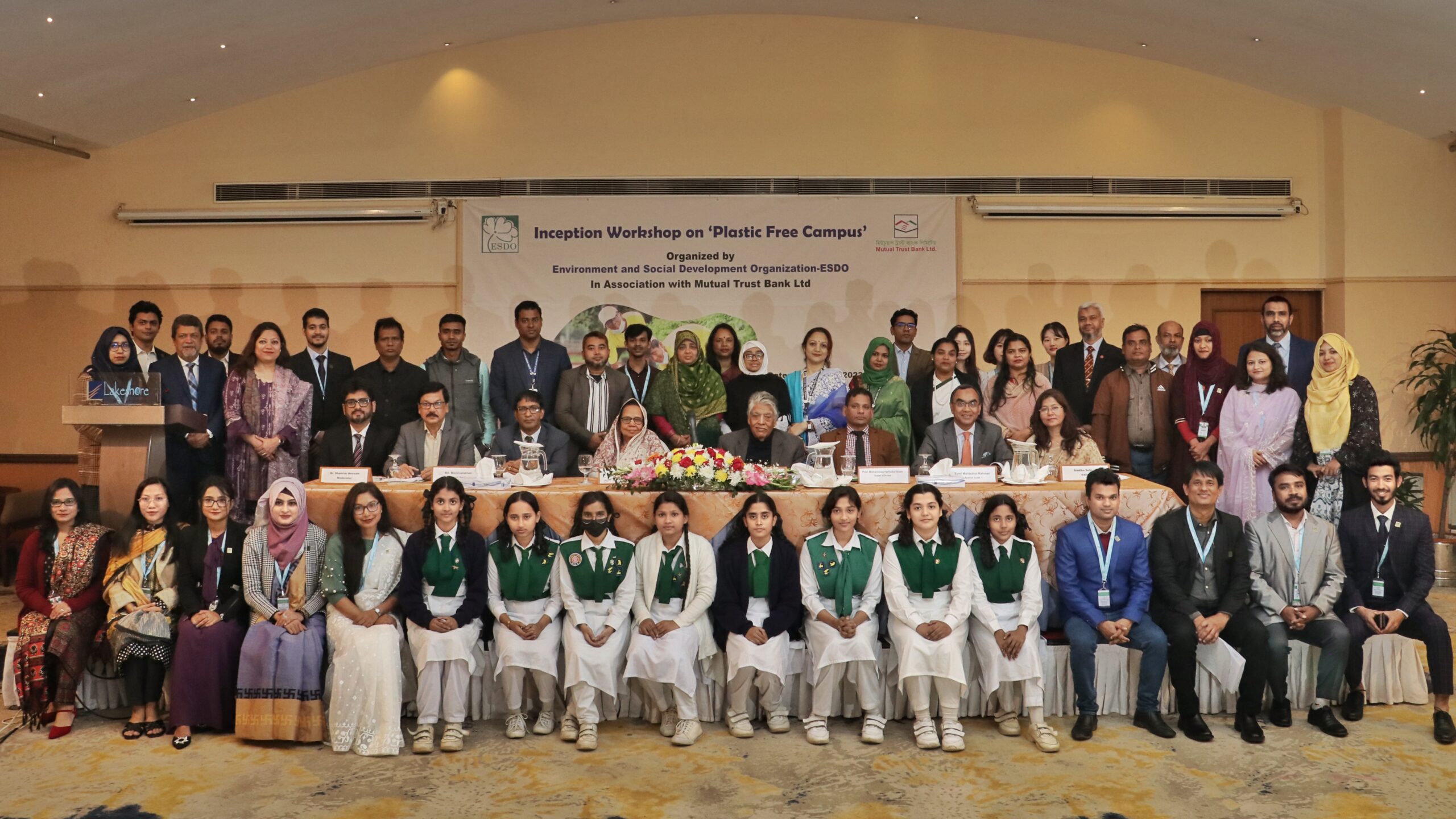
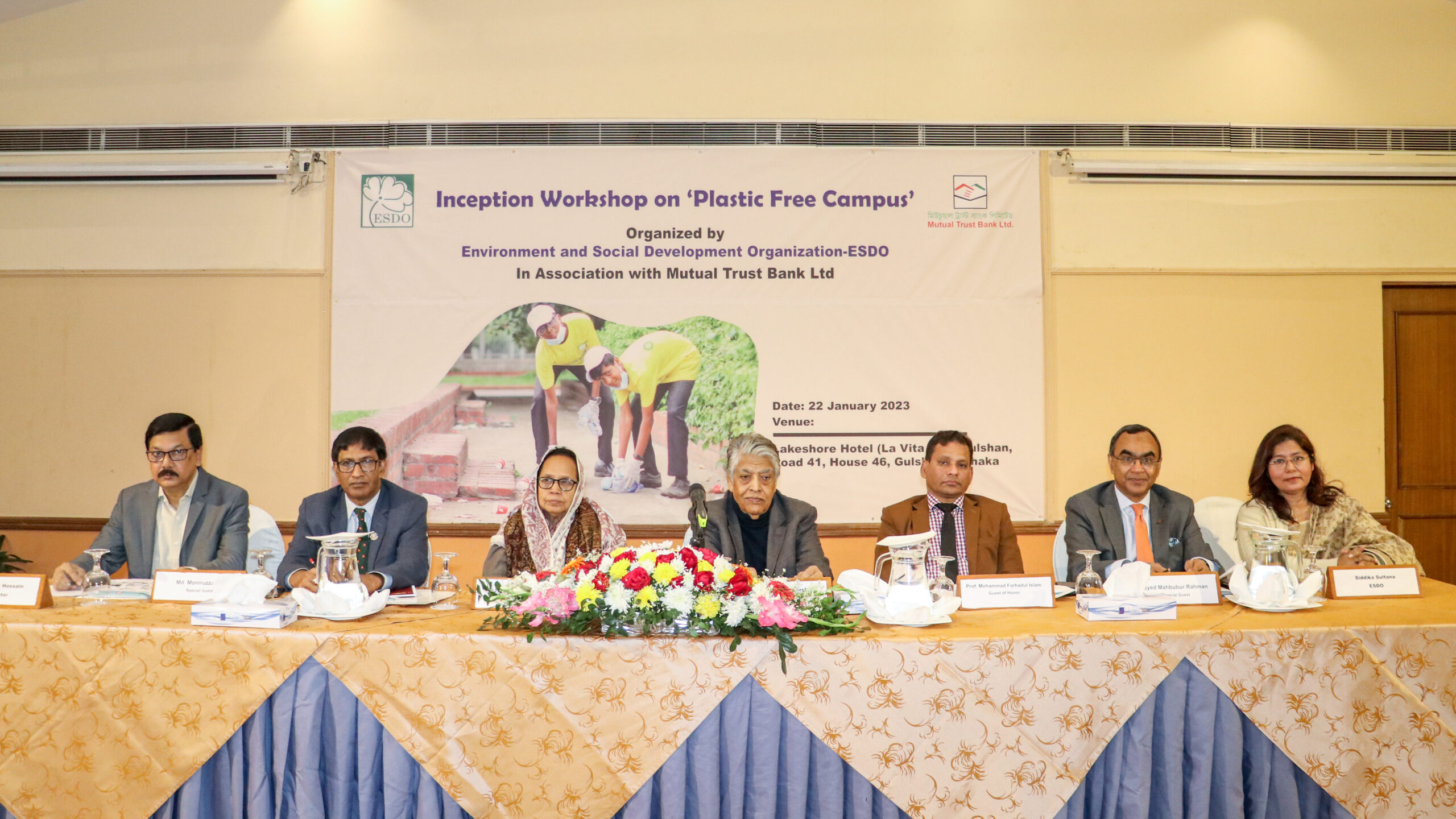
Recognition from the Directorate of Secondary and Higher Education
According to the department’s letter, consent has been given to the ‘Environment and Social Development Organization (ESDO)’ subject to conditions for carrying out various activities under the ‘Plastic-free Campus Initiative project in educational institutions under the control of the Directorate of Secondary and Higher Education.
